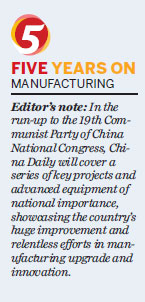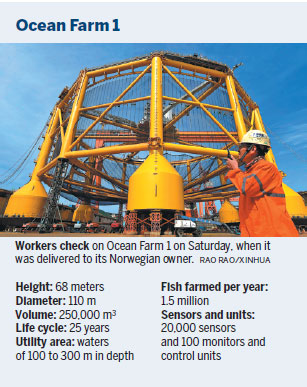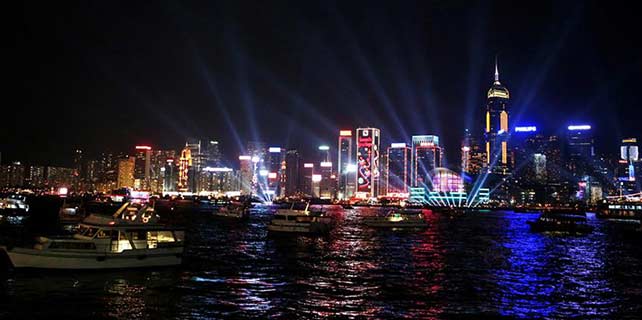Norway's fish industry gets Chinese boost
Editor's note: In the run-up to the 19th Communist Party of China National Congress, China Daily will cover a series of key projects and advanced equipment of national importance, showcasing the country's huge improvement and relentless efforts in manufacturing upgrade and innovation.
China is delivering the world's first batch of intelligent offshore ocean farming facilities to Norway, designed to enhance the efficiency and effectiveness of the country's aquaculture industry, the equipment's manufacturer and analysts said on Sunday.

China Shipbuilding Industry Corp, one of the country's major State-owned shipbuilders by revenue, will create and export six offshore fish farms to its Norwegian client to help upgrade salmon farming there.
CSIC delivered the first such facility, Ocean Farm 1, to its Norwegian client, Kverva-based SalMar ASA, in Qingdao on Saturday. The second batch of orders for another five units was sealed in April, with a combined value of more than $300 million.
It is the world's first offshore salmon farming equipment built on the same principle as semisubmersible installations used in the offshore oil and gas drilling sector, according to Hu Wenming, chairman of CSIC.
Unlike traditional fish farming facilities, the ocean farm embodies advanced technologies including automatic fishing, hydrological monitoring, deep-sea positioning and biological light adjustment systems.
Ocean Farm 1 comprises a slack-anchored, semisubmersible and rigid structure with a high degree of stability. It is intended for offshore installation in waters at 100 to 300 meters in depth. All fish-handling operations can be performed on board, without recourse to external service vessels or equipment.
With a 25-year lifespan, the facility can resist powerful typhoons and is able to cultivate 1.5 million fish a year. It requires only three to seven employees to operate and ensures a fish death rate of fewer than 2 percent. It has more than 20,000 sensors and over 100 monitors and control units.
"It is highly possible for more marine production companies from countries such as the United States, Canada, Denmark, Ireland and the United Kingdom to purchase such facilities if they can prove themselves reliable and advanced," said Dong Liwan, a professor at Shanghai Maritime University.
In the eyes of Yang Zhigang, chairman of CSIC's Wuchang group, the project is a perfect combination of the Norwegian aquaculture industry and Chinese offshore engineering technologies. The facility can be another trailblazer for Chinese manufacturers to further tap the European market under the backdrop of the Belt and Road Initiative.
As the Norwegian government and companies are keen to drive deep-sea aquaculture to further prevent fish diseases and pursue sustainable growth, the market for intelligent marine aquaculture equipment is getting a big shot in the arm, said Wang Yu, president of research institute for offshore engineering products at CSIC Wuchang.
Ocean Farm 1 will be positioned in Frohavet, off the coast of central Norway, in the second half of 2017. It will be utilized for research purposes, as well, with a particular focus on biological conditions and fish welfare, said Trond Williksen, chief executive at SalMar ASA.
"Leading Chinese shipyards are in a better position to compete with rivals in South Korea or Singapore, especially in the fields of ultra-deep-water semisubmersible drilling rigs, manned submersibles and others civilian and military-oriented businesses," said Dong, from Shanghai Maritime University.
He said there is less competition in these areas as only a few shipyards are capable of manufacturing complex offshore engineering products. Big data and internet-based information technologies also will help upgrade their capabilities to innovate and make their products more intelligent.
"China and Norway are highly complementary in their economic developments, with great potential in fisheries, shipping building, environmental protection and oil and gas exploitation," said Xing Houyuan, a member of the expert committee of the Beijing-based China Council for the Promotion of International Trade.

(China Daily USA 06/05/2017 page1)
















